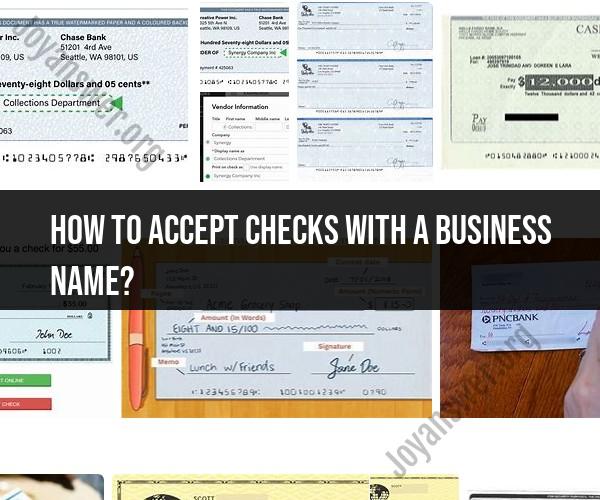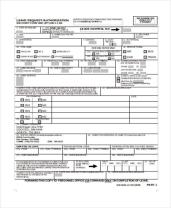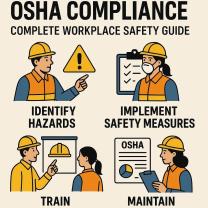How to accept checks with a business name?
Accepting checks with a business name involves certain procedures and requirements to ensure the transactions are secure and legitimate. Here's a step-by-step guide on how to accept checks for your business:
Establish a Business Bank Account:
- Before you can accept checks in your business name, you need to have a dedicated business bank account. This account should be separate from your personal account and registered under your business name.
Business Name and Address on Checks:
- Ensure that your business name, address, and contact information are printed on the checks you receive. This information helps you identify the source of the check.
Verify the Check:
- When you receive a check, take the following steps to verify its authenticity:
- Check for any alterations, erasures, or discrepancies on the check.
- Verify that the signature matches the name printed on the check.
- Look for watermarks, security features, and other elements that indicate it's a valid check.
- When you receive a check, take the following steps to verify its authenticity:
Endorse the Check:
- On the back of the check, endorse it with your business name exactly as it appears on your bank account. You can use a stamp or write it manually.
Deposit the Check:
- Deposit the check into your business bank account. You can do this by visiting a bank branch, using an ATM with deposit functionality, or through mobile banking if your bank offers this service.
Record the Transaction:
- Keep accurate records of all check transactions, including the date, check number, payee's name, and the amount. This helps with bookkeeping and reconciling your accounts.
Funds Availability:
- Be aware that it may take a few business days for the funds from the check to clear and become available in your account. Ensure you have sufficient funds in your account to cover any checks you deposit.
Return Check Policy:
- Develop a policy for handling returned checks (bounced checks). This policy should outline any fees or penalties you charge for returned checks and the steps you take to collect the owed funds.
Check Acceptance Policy:
- Establish a clear policy for accepting checks, including any restrictions, limits, or requirements. Communicate this policy to your customers, so they understand the terms.
Train Your Staff:
- If you have employees who handle checks on your behalf, ensure they are trained on your check acceptance procedures and policies.
Use Electronic Check Processing:
- Consider using electronic check processing services, which can expedite the check deposit process and reduce the risk of fraud.
Security Measures:
- Implement security measures to protect against check fraud, such as using security ink, keeping checks in a secure location, and shredding old or voided checks.
Remember that accepting checks comes with a certain level of risk, as checks can bounce or be fraudulent. It's essential to have clear policies in place, maintain accurate records, and exercise due diligence when accepting checks to protect your business's financial interests.
How to Establish and Accept Checks Under Your Business Name
To establish and accept checks under your business name, you will need to:
- Register your business name. You can do this by filing a Doing Business As (DBA) name with your state or county government.
- Open a business checking account. You can do this at any bank or credit union. Be sure to provide your business name and DBA name when you open the account.
- Order business checks. You can order business checks online or from your bank or credit union. Be sure to include your business name and DBA name on the checks.
Benefits of Using a Business Name for Check Acceptance
There are several benefits to using a business name for check acceptance:
- Professionalism. Accepting checks under your business name makes your business look more professional and established.
- Liability protection. If a customer writes you a bad check, you may be able to pursue legal action against them if you have accepted the check under your business name.
- Tax benefits. You can deduct business expenses, such as check processing fees, from your business taxes.
- Ease of accounting. It is easier to keep track of your business finances if you have a separate business bank account and accept checks under your business name.
Steps to Ensure Smooth Transactions with Checks in Your Business Name
Here are some steps to ensure smooth transactions with checks in your business name:
- Verify the check. Before you accept a check, verify that it is properly written out and includes all of the necessary information, such as the customer's name, address, and bank account number.
- Endorse the check. Once you have verified the check, endorse it by writing your business name and account number on the back of the check.
- Deposit the check promptly. Deposit the check into your business checking account within a few days of receiving it. This will help to reduce the risk of fraud.
- Keep a record of all transactions. Keep a record of all checks that you accept and deposit. This information will be helpful if you need to track down a lost or stolen check or if you have to dispute a charge with a customer's bank.
By following these tips, you can establish and accept checks under your business name in a way that is professional, secure, and efficient.













